Nephrology is the medical field that deals with issues regarding the kidneys.
Luckily, the 10th of March is world kidney day which is a day set aside to create awareness about kidney diseases.
The theme of the day was kidney health for all.
We had an outreach and talked to the public about kidney health and so I decided to write a post about the kidneys.
kidney diseases can be life-threatening and management can be very expensive. this is why protecting one's kidney is very important.
At some point, I started comparing cancer and nephrology patients in terms of outcome, disease progression, and mortality. After thinking it through, I think cancer patients suffer more.
That being said, let's get straight to the business of the day.
In this post, I will be discussing chronic kidney diseases under the following outline
- The kidneys
- What is chronic kidney disease?
- Distribution of chronic kidney disease
- what are the causes of chronic kidney disease
- What are the risk factors of chronic kidney disease?
- what are the symptoms of chronic kidney disease
- what are the earliest and easiest way to diagnose a kidney disease
- How to prevent chronic kidney disease.
The kidneys
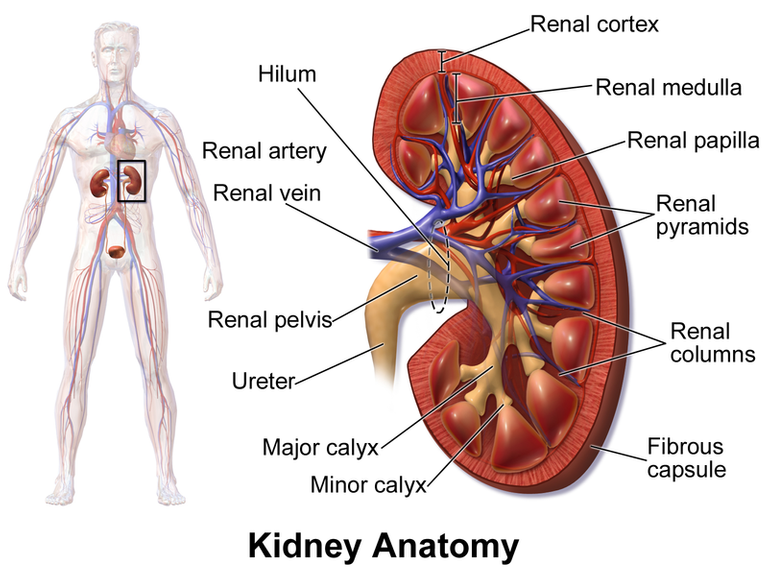
By Blausen.com staff (2014). "Medical gallery of Blausen Medical 2014". WikiJournal of Medicine 1 (2). DOI:10.15347/wjm/2014.010. ISSN 2002-4436. - Own work, CC BY 3.0, Wikimedia
The kidneys are a pair of bean-shaped organs that help with a variety of functions.
These functions are crucial for the maintenance of good health.
The functions include;
- Fluid and electrolyte balance; The kidney helps to balance the input and output of fluid in the body. It also helps to create a balance in electrolyte levels like sodium and other electrolytes in the body.
- Excretion of toxic waste such as urea, and creatinine.
- Erythropoiesis- which is the process of formation of red blood cells from stem cells
- Calcium and phosphate metabolism- this involves mainly bone formation.
When the kidney fails, these functions are impaired and people come down with various manifestations of impaired functioning.
What is chronic kidney disease?
This is when the kidney fails in terms of normal functioning over 3 months.
how do we assess the failure of the kidneys
The muscle has protein which after being used is broken down. The protein is called creatine and the breakdown product is called creatinine. Creatinine is meant to be excreted.
Also, when we eat proteinous food, it is being absorbed and metabolized. During metabolism, it is being broken down into amino acids and urea.
Urea is toxic to the body.
Under normal circumstances, the kidney clears these toxins out of the bloodstream.
When the kidney functions are getting impaired, there is a build-up of these toxins as a result of the failure inf the clearing capacity of the kidneys.
Therefore, assessing for the level of these toxins in the blood usually gives a picture of renal function and this forms the basis of the serum electrolyte and urea test done in hospitals and renal centers.
How common is chronic kidney disease?
Chronic kidney disease is very common. It can happen in any age group.
One in every ten persons worldwide has chronic kidney disease. This translates to about 10% of the total population.
Studies have estimated that over 500 million people have one stage of chronic kidney disease worldwide.
Research shows that about 13% of the world population has CKD.
The sex prevalence of chronic kidney disease varies from region to region.
For example, a study done in the northern part of Nigeria shows that women come down more with CKD than men.
Different reasons have emanated for the prevalence in women which include the lifespan of women, obesity,, and diabetes.
In developed climes, the major fraction of patients with CKD are the elderly. It was observed that the mean age of patients with CKD falls under the age bracket of 65-75 years. This goes to say that ageing is a big risk factor for CKD.
This is why as one grows older, care should be focused on the major organs of the body.
Currently, at my workplace, we have more female patients with CKD compared to men.
It is important to note that children can also come down with CKD too. According to the CDC, almost 10,000 children and Adolescents in the United States are living with End-Stage Renal Disease.
My first encounter with a CKD patient was a 3 year old boy who had a posterior urethral valve without treatment. He died later on.
What is worthy of note is that when children come down with CKD, it is most likely a problem from birth and early diagnosis and treatment will go a long way in preventing disease.
WHAT ARE THE CAUSES OF CHRONIC KIDNEY DISEASE
Chronic kidney disease can be caused by a lot of things and conditions.
However, the commonest causes of CKD are;
- Hypertension
- Diabetes
- Chronic glomerulopathies
- Autosomal polycystic kidney disease
- Obstructive uropathies
In countries like Nigeria, hypertension has been noticed to account for as high as 39% of the causes of patients with CKD.
Other causes include renal artery stenosis which occurs when the lumen of the artery supplying the kidney is narrowed. This leads to a reduction in blood flow to the kidney with the net resultant effect of ischemia and death of cells in the kidneys,
Also, conditions like systemic lupus erythematosus have been implicated as a cause of CKD.
Infections have been seen to cause CKD too. HIV-associated nephropathy is a prominent cause of CKD secondary to an infection. When HIV is a cause of CKD, it usually presents faster than other causes.
hepatitis B and C are also notorious for causing CKD. I am currently seeing a patient with hepatitis B and I feel, it has a role in worsening the outcome of CKD.
In the Subsaharan region where malaria is endemic, malaria can be complicated by CKD.
Drugs have been implicated in the cause of CKD. Antibiotics like gentamicin have been reported severally to be nephrotoxic and hence, should be used with care.
Drugs like diclofenac and other NSAIDS are not good for the kidneys and so should never be used if there is a better and safer option. When analgesic use cause CKD, it is called analgesic nephropathy.
There are conditions that prevent urine from going out of the body. These conditions are collectively referred to as obstructive uropathy. This obstruction leads to backflow of urine to the kidney and then causes the kidney to fail. Conditions under this group include Benign prostatic hyperplasia, Prostate cancer, etc.
What are the risk factors for CKD.
There are factors that increase one's chance of having CKD and they include
- Age; as I said earlier, as people age, the higher their chances of CKD.
- Unhealthy Diet: Eating things that are unhealthy increases the risk of diabetes which in turn increases the risk of CKD
- Alcohol and smoking- most chronic diseases are worsened by smoking and alcohol
- Obesity
- Lack of exercise; Exercise helps with maintaining good cardiac function and also helps with a reduction in weight gain. A sedentary lifestyle increases the risk for hypertension and this, in turn, increases the risk of CKD.
- Poorly controlled hypertension- People who are hypertensive are meant to use their drugs religiously for life. When a patient does not adhere to his drugs, he can come down with a mirage of conditions like CKD, myocardial infarction, and stroke.
- Poorly controlled diabetes
- Poor water intake- It is recommended that we should take at least 2 liters of water a day as this helps the kidneys to function properly.*
What are the earliest signs and symptoms of CKD?
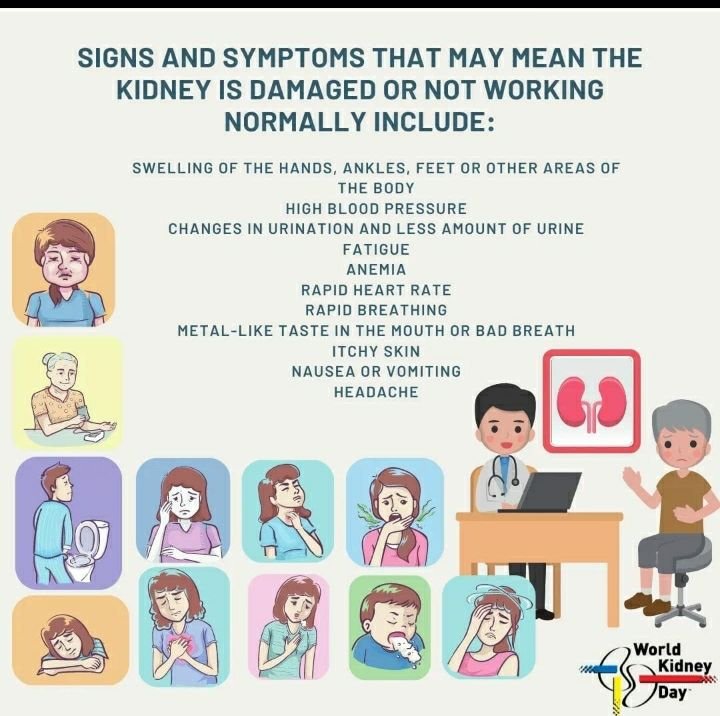
The onset of CKD is usually insidious and asymptomatic. The fact that it is asymptomatic when it starts is very worrisome.
CKD has different stages from stages 1 to 5.
Most patients with stage 1 and 2 CKD are asymptomatic and this is why the disease is very fatal and appropriate screening is very important.
However, there are some symptoms that might give signals towards CKS and they include;
Decrease in urine output plus passing very concentrated urine. Sometimes they might pass very little urine for a day.
-** Unexpected hypertension;** This usually comes as a shock to most people. Sometimes they are rushed into the emergency and during the routine investigations, they discover they have a high level of Urea and Creatinine in their blood as well as persistently high blood pressure.Asymptomatic proteinuria: Protein in urine is a sign of kidney disease and so when a patient does a urinalysis and sees protein in his urine this can be a very early sign of kidney disease. Urinalysis is by far the cheapest way to detect kidney disease.
Progressive facial and body swelling: This usually happens early in the morning and later gets better as the day goes by.
Fatigue
Anorexia
Nausea and vomiting.
The above features are signs of early kidney disease. The importance of this is that once you discover it, you can see a nephrologist who can help with medications and recommendations that can help to delay the progression.
The late features include;
- Worsening nausea and vomiting
- Gastritis
- Uremic fetor
- Uremic encephalopathy
- Coma
- Death in the absence of Renal transplant or dialysis.
Most of the late features are due to complications of build up of Urea.
Diagnosing kidney disease.
There are different investigations that are done by the doctors to help check your kidney. Some of them are quite cheap while others are expensive.
Urinalysis is a basic test that can be conducted by a doctor or a lab scientist. It costs less than a dollar in my center. it is capable of detecting abnormalities in the urine. This is usually the first test done to assess the kidneys. It is a dipstick test like a pregnancy test just that it has color coding that shows the various concentration of various constituents in the urine.
Serum electrolytes, urea, and creatinine: This test is a standard way of assessing CKD. it is a blood test that measures the concentration of urea and creatinine in the blood. Higher values than normal indicate impaired renal function.
Renal ultrasound is an imaging modality of diagnosing kidney disease.
Renal biopsy- This is a test done by getting the tissue of the kidneys and examining them under the microscope. Some causes of CKD have histologic diagnosis e.g Nephrotic syndrome.
How to prevent CKD
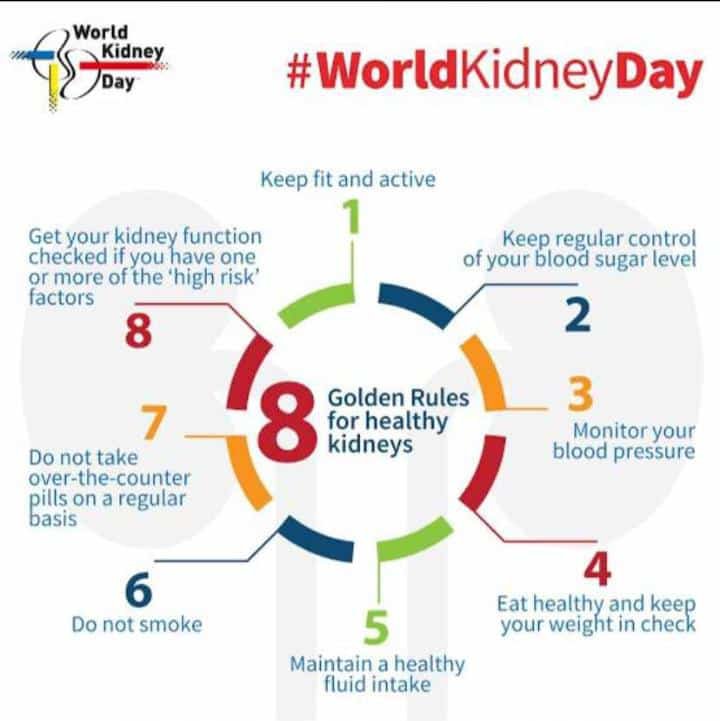
CKD is a very preventable disease and much of it lies in our lifestyle.
Prevention of CKD starts with
- General education and counseling of the public as regards the nature of the illness. Also, educating the public on the importance of lifestyle modification, proper drug use, and the importance of regular clinic check-ups.
- Avoidance of nephrotoxic chemicals and drugs. Bleaching cream contains hydroquinone which is notorious for causing certain diseases of which CKD is among. Indiscriminate use of antibiotics and analgesics can cause CKD and so avoidance of these drugs can reduce your risk significantly.
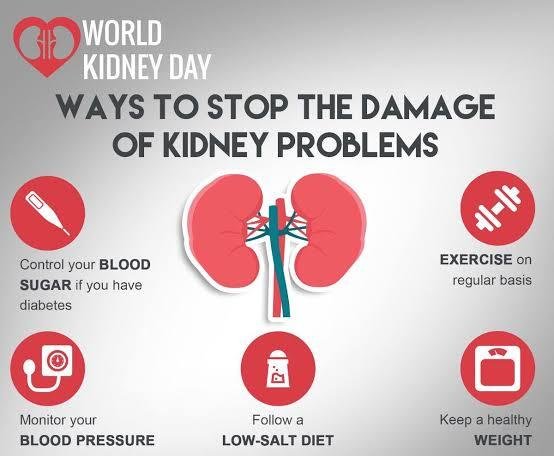
- Immunisation has proven to be the messiah of this century. Some infections like HBV and streptococcus have been observed to be aetiologic agents in the causation of kidney diseases. Immunization against these organisms is a significant preventive measure.
- Healthy lifestyle which includes drinking lots of water, eating healthy, and exercising can help prevent diabetes and hypertension.
- Regular medical checkups- One of the problems of the health systems in Africa is the poor health-seeking behavior of patients. This is why mortality is more in sub-Saharan Africa than the developed countries.
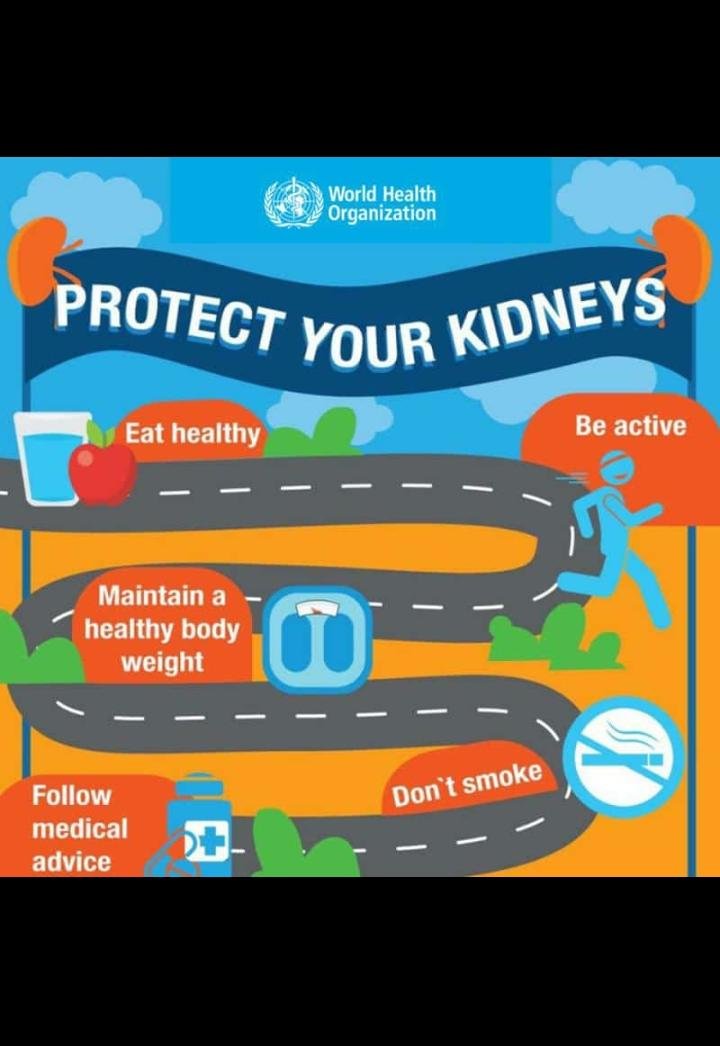
- Population screening for proteinuria, haematuria, and glycosuria will help with the early detection of the disease.
- Adherence to blood pressure drugs- poorly controlled hypertension is a major risk factor in CKD and so aggressive adherence to BP drugs can halt the progression of the disease.
- Adherence to anti-diabetic medication.
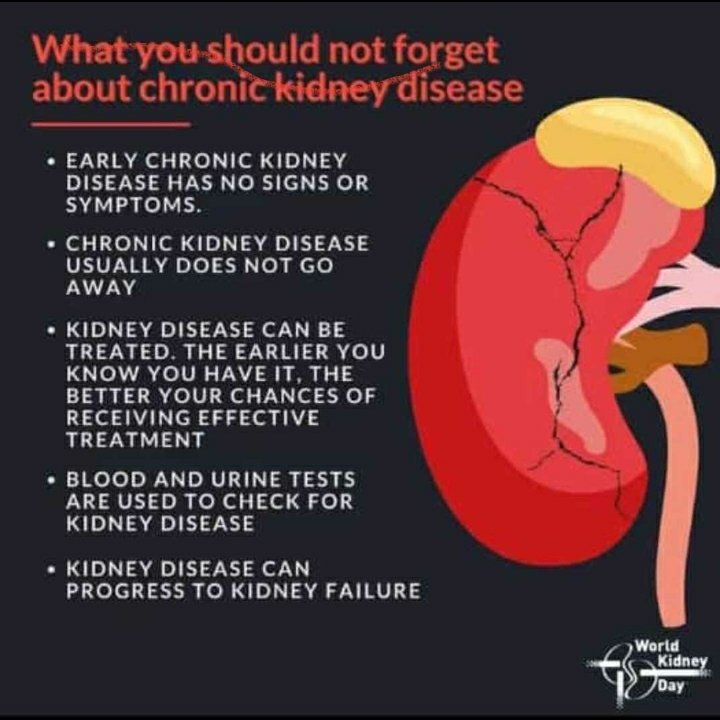
REFERENCES
<center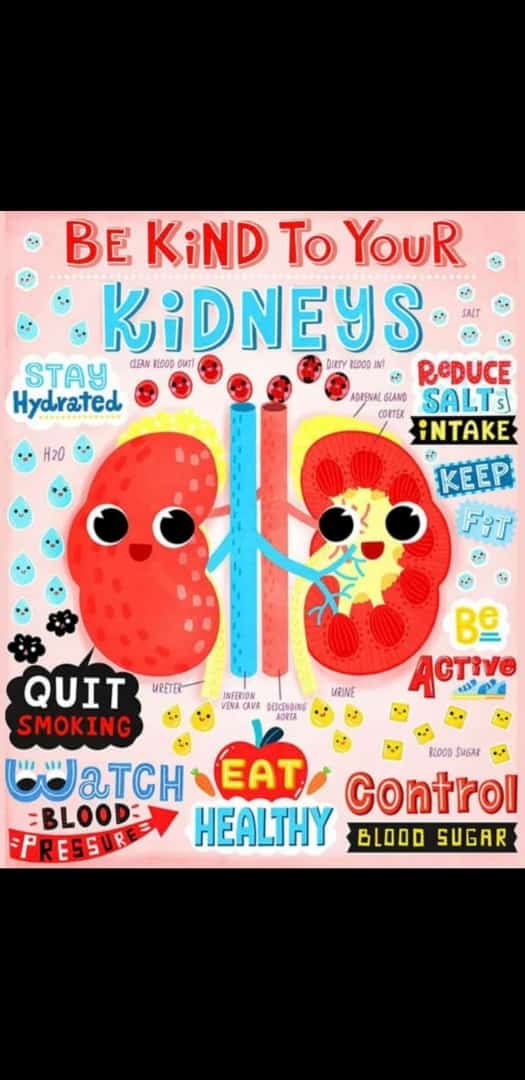
All pictures from this post are free to use pictures for public health purposes
